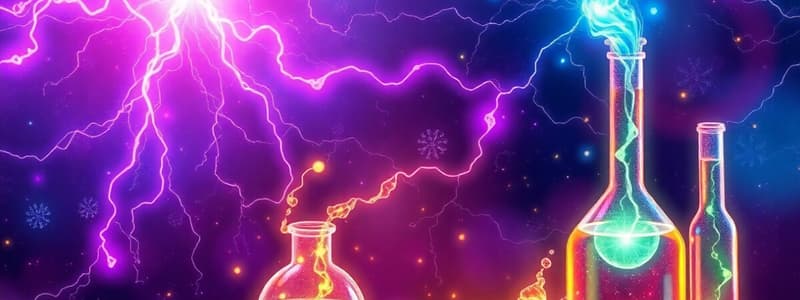Podcast
Questions and Answers
The electrochemical series lists elements in order of their standard atomic weights.
The electrochemical series lists elements in order of their standard atomic weights.
False (B)
Elements higher in the electrochemical series are more reactive than those lower down.
Elements higher in the electrochemical series are more reactive than those lower down.
True (A)
Electrolysis involves a chemical reaction that occurs when electricity passes through a catalyst.
Electrolysis involves a chemical reaction that occurs when electricity passes through a catalyst.
False (B)
Lead bromide must be in a solid state for electrolysis to occur efficiently.
Lead bromide must be in a solid state for electrolysis to occur efficiently.
Sodium can be extracted from its compound sodium chloride through electrolysis.
Sodium can be extracted from its compound sodium chloride through electrolysis.
Electrolytes are compounds that can conduct electricity when solid.
Electrolytes are compounds that can conduct electricity when solid.
Copper electrodes are used in the electrolysis of copper sulfate solution to purify copper.
Copper electrodes are used in the electrolysis of copper sulfate solution to purify copper.
In electroplating, the object to be plated is connected to the positive terminal of the battery.
In electroplating, the object to be plated is connected to the positive terminal of the battery.
Active electrodes react with the electrolyte in which they are immersed.
Active electrodes react with the electrolyte in which they are immersed.
Electrolysis can be defined as the use of an electric current to induce a chemical reaction in an electrolyte.
Electrolysis can be defined as the use of an electric current to induce a chemical reaction in an electrolyte.
The impurities from the copper electrolytic process remain in solution.
The impurities from the copper electrolytic process remain in solution.
Silver, chromium, zinc and tin are commonly used metals for electroplating.
Silver, chromium, zinc and tin are commonly used metals for electroplating.
Inert electrodes do not react with the electrolyte they are in contact with.
Inert electrodes do not react with the electrolyte they are in contact with.
Flashcards
Electrolysis
Electrolysis
Using electricity to cause a chemical reaction in an electrolyte.
Electrolyte
Electrolyte
A compound that conducts electricity when molten or dissolved in water.
Electrode (inert)
Electrode (inert)
An electrode that doesn't react with the electrolyte.
Copper purification
Copper purification
Signup and view all the flashcards
Electroplating
Electroplating
Signup and view all the flashcards
Electrode (active)
Electrode (active)
Signup and view all the flashcards
Electroplating Purpose
Electroplating Purpose
Signup and view all the flashcards
Electroplating Materials
Electroplating Materials
Signup and view all the flashcards
Electrochemical Series
Electrochemical Series
Signup and view all the flashcards
What does the Electrochemical Series tell us?
What does the Electrochemical Series tell us?
Signup and view all the flashcards
Electrolysis: What is it?
Electrolysis: What is it?
Signup and view all the flashcards
Why molten lead bromide needed for electrolysis?
Why molten lead bromide needed for electrolysis?
Signup and view all the flashcards
Electrolysis: Half-Reactions
Electrolysis: Half-Reactions
Signup and view all the flashcards
Study Notes
Electrochemistry
- Electrochemistry is divided into two areas: using an electric current to cause chemical reactions, and using chemical reactions to produce an electric current.
- Electrolysis: using electricity to cause a chemical reaction in an electrolyte.
- Electrolyte: a compound that conducts electricity when molten or dissolved in water.
- Electrodes: used to make contact with the electrolyte. Often made of carbon or platinum as they don't react with the electrolyte.
- Inert electrodes: do not react with the electrolyte they're in.
- Active electrodes: do react with the electrolyte.
- Copper purification: electrolysis is used to purify copper. Impure copper is the positive electrode, pure copper is the negative electrode. Pure copper is plated onto the negative electrode, and impurities fall to the bottom of the cell.
- Electroplating: a process where electrolysis is used to put a layer of one metal onto another metal.
Electrochemical Series
- Definition: the electrochemical series lists elements in order of their standard electrode potentials.
- The elements at the top of the list lose electrons more easily than elements further down. Those in the top are more reactive.
Electrolysis of Molten Lead Bromide
- Electrolysis is a chemical reaction that occurs when electricity passes through an electrolyte.
- Lead bromide must be molten to allow the ions to move freely.
- Suitable electrode material is platinum.
- Balanced half equations for electrode reactions:
- Pb2+ + 2e- → Pb
- 2Br- → Br2 + 2e-
- Sodium is a metal extracted from its compounds (sodium chloride) by electrolysis, other than lead.
Studying That Suits You
Use AI to generate personalized quizzes and flashcards to suit your learning preferences.




